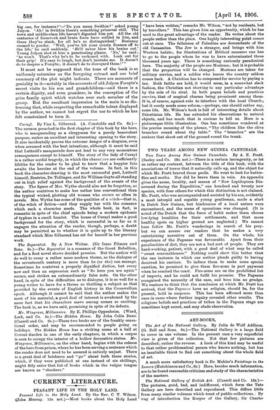TWO YEARS AMONG NEW GUINEA CANNIBALS.
Two Years Among New Guinea Cannibals. By A. E. Pratt. (Seeley and Co. 16s. net.)—There is a certain incongruity, or let us rather say contrast, between the title of this book,. with the associations of terror that it naturally calls up, and the object for which Mr. Pratt braved these perils. He went to look for butter- flies and moths. Nor did he brave them in vain. An appendix gives the name, locality, and season of "New Lepidoptera Dis- covered during the Expedition," one hundred and twenty. new species, with four others for which this distinction is not claimed. Mr. Pratt, who was accompanied and assisted by his son, evidently a most intrepid and capable young gentleman, made a start in Dutch New Guinea, but hindrances of a local nature were encountered, and the scene of operations was changed. (It is noted of the Dutch that the force of habit makes them choose low-lying localities for their settlements, and that more healthy spots on higher ground are neglected.) We cannot here follow Mr. Pratt's wanderings in search of his prey, but we can assure our readers that he makes a very, entertaining narrative out of them. On the whole, his experience of the Papuans was favourable. Apart from their peculiarities of diet, they are not a bad sort of people. They are hard-working, patient, with a good deal of what may be called "sweet reasonableness." Nothing could show this better than the one instance in which our author pleads guilty to having deceived his carriers. To induce them to make some special exertion, he promised to give them fire-arms in part payment when he reached the coast. Fire-arms are on the prohibited list of imports, and he could not fulfil his promise. The Papuans recognised the necessity of the case, and bore him no grudge. We venture to think that the conclusion at which Mr. Pratt has arrived, that the Papuans have no religion, should be, for the present, held in suspense. This has been affirmed more than once in cases where further inquiry revealed other results. The religious beliefs and practices of tribes in the Papuan stage are sometimes kept secret, and may elude observation.






































 Previous page
Previous page